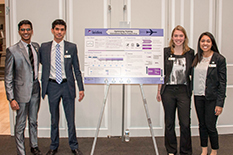QUEST Students Design Training Program for Growing Leidos Team
Clark School students explored their social sciences side in Fall 2017 to design and recommend a training program for Leidos engineers hired to develop air traffic control software. The team, which includes Clark School’s Chyanne Nader (civil and environmental engineering) and Samantha Weaver (chemical engineering), is part of the Quality Enhancement System and Teams (QUEST) honors program. The Skyline Air Traffic Management System is a suite of tools used in countries like the United Kingdom, New Zealand, and Kazakhstan to enhance safety, improve on-time performance, and increase fuel efficiency. The team that builds it is based in Maryland and growing quickly—so much so that Leidos decided to shift from a buddy system to a streamlined process for onboarding new employees. That’s when they turned to QUEST. QUEST connects students from the Robert H. Smith School of Business, the A. James Clark School of Engineering, and the College of Computer, Mathematical, and Natural Sciences to consult with real-world clients. For their capstone project with Leidos, Nader and Weaver teamed up with business student Parth Talwar, computer science student Waliullah Rifai, and business school faculty advisor David Ashley. The team went on three site visits to Leidos, during which they interviewed current employees and conducted focus groups to better understand the current training process. “We worked as a team to think, ‘How would I want to be trained if I was an engineer?’” said Nader. “Or, ‘How can we alleviate the problems or opportunities that we found?’” At the heart of their recommended training program is a sandbox coding environment that allows new employees to modify Skyline’s roughly 8,000 lines of code without impacting the product. The sandbox would be coupled with mentor training and an introductory program to ensure all employees start work with the same knowledge. Nadar, Weaver, and the other team members also recommended conducting anonymous surveys after the training to monitor growth and improvement. The final training program was presented during the QUEST Conference in December 2017. “After our first visit, I was like, ‘Well I’m not qualified for this at all.’ But you’d be surprised how much you wind up drawing on your background as a student,” Weaver said. “You learn things during school projects—like how to pick up on new ideas quickly and where to look for new information when you have questions—that's applicable to the real world regardless of the training topic."
Related Articles: January 23, 2018 Prev Next |


